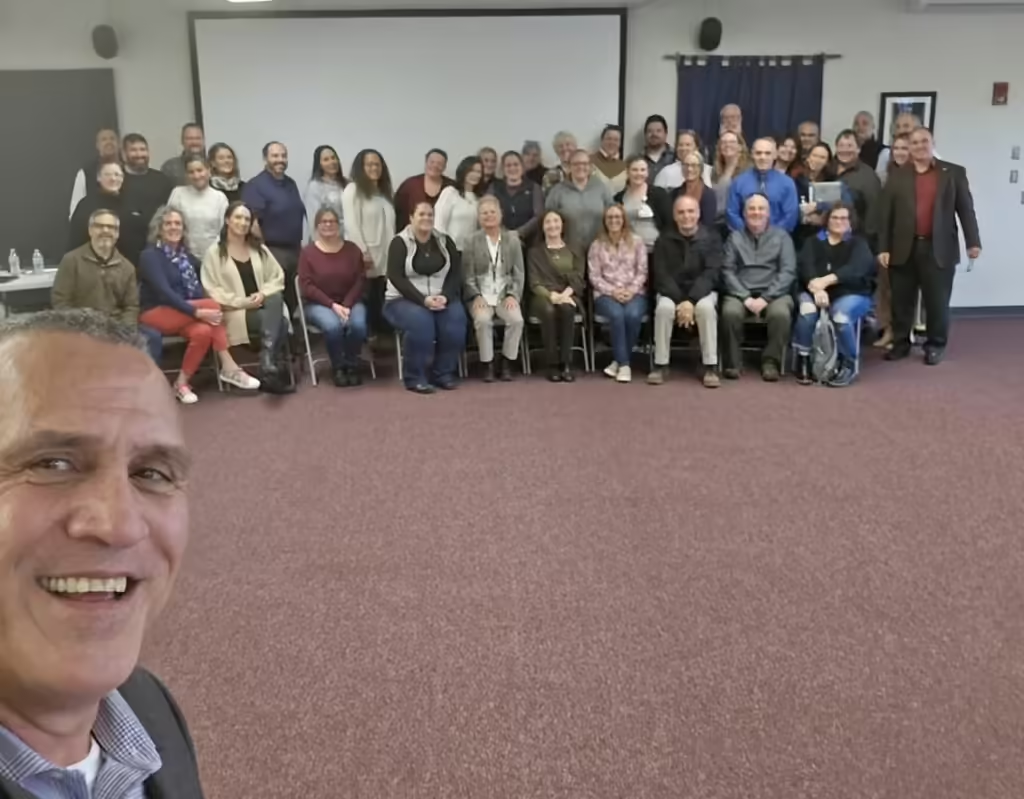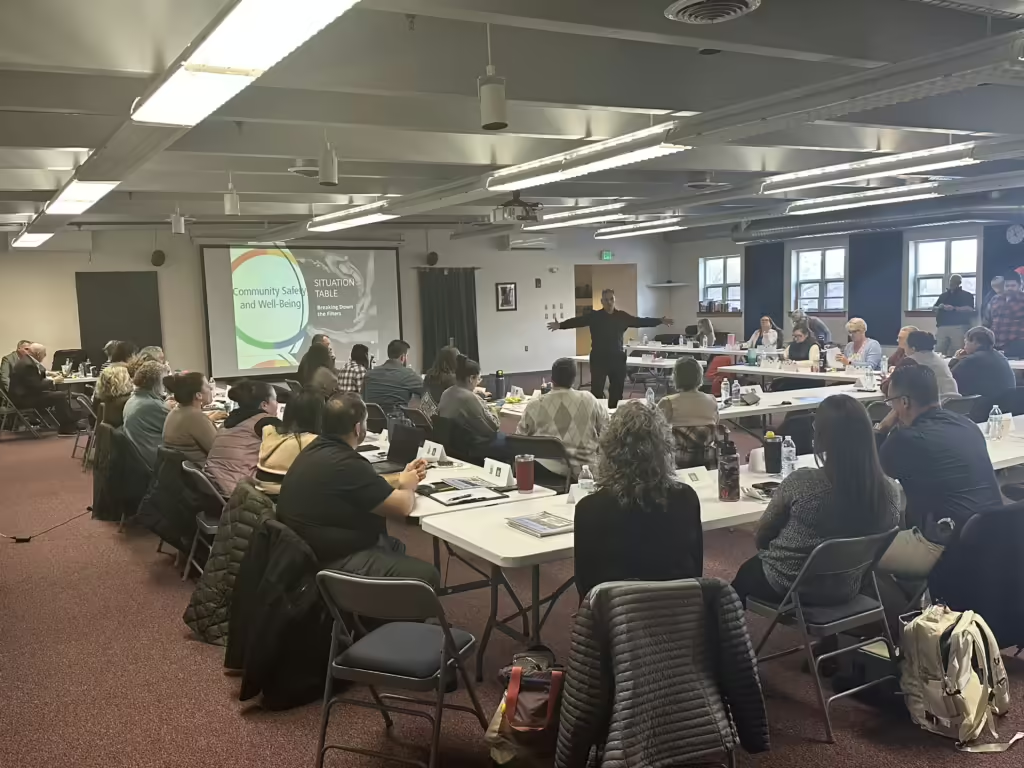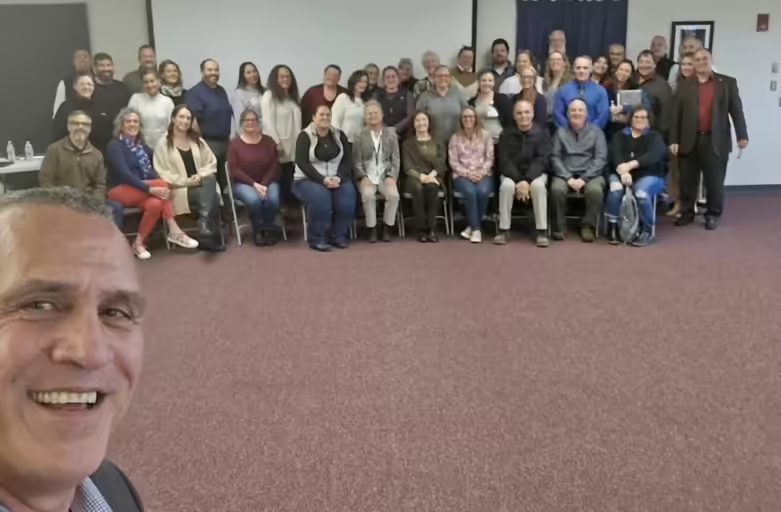
O2SL & QRT National and Cordata Senior Community Engagement Specialist Michael Botieri, bottom left, and Senior Community Engagement Specialist Scott Allen, far right, delivered a Situation Table Training in Bennington, Vermont earlier this month. (Photo courtesy Operation 2 Save Lives & QRT National and Cordata)
BENNINGTON, Vermont — Operation 2 Save Lives (O2SL) & QRT National and Cordata recently delivered a two-day Situation Table Training session for Bennington, Vermont.
On Nov. 12 and 13, 54 attendees representing more than 30 agencies were trained at the Bennington Fire Department in Vermont on the Situation Table model, a strategy that facilitates multi-agency interventions for those at risk of experiencing a crisis. The county anticipates launching Situation Table meetings in early December.
O2SL & QRT National and Cordata Senior Community Engagement Specialist Michael Botieri, Senior Community Engagement Specialist Scott Allen, and Subject Matter Expert Dan Cortez of the Chelsea Police Department in Massachusetts delivered the training. The Situation Table trainings are sponsored and funded through Vermont Gov. Phil Scott’s Public Safety Enhancement Team (PSET). Four pilot sites were identified through the PSET Consortium, with Bennington being the first to participate in the Situation Table training, followed by Springfield (this week) and Brattleboro in early December. The fourth site is to be determined.
The participants who attended the training came from numerous partner agencies, including the Bennington Police Department; Bennington Fire Department; Vermont State Police; Manchester Police Department; Bennington EMS; Blueprint Bennington; Bennington County Child Advocacy Center; Vermont Department of Child and Family Services; Southwestern Vermont Healthcare; City of Burlington representatives; local mental health, substance use, social services and community engagement organizations; school districts; and public health and community care agencies.
The Situation Table model is being introduced to the state of Vermont through PSET, in support of Gov. Scott’s 10-point Public Safety Enhancement and Violent Prevention Action Plan. The governor’s plan includes addressing specific goals that the Situation Table is designed to address.
The training focused on equipping the attending agencies with the skills and lessons necessary to mobilize and launch their Situation Table. A Situation Table is a unique, risk-based rapid triage model that brings together multiple human service providers to address situations where individuals and families face a specific Acutely Elevated Risk (AER) threshold. Situation tables comprise representatives from public safety agencies, public health agencies, service providers, and other community partners.
“Our training in Vermont brought together professionals across various sectors, and the input we received from those in public safety, health, education, social services, and more was incredibly valuable,” Senior Community Engagement Specialist Botieri said. “We look forward to seeing how the agencies will launch their Situational Table meetings in accordance with the governor’s Public Safety Enhancement Team initiative.”
O2SL and QRT National and Cordata thank the local project sponsor, Vermont PSET Consortium, and community organizers, including Bennington Fire Chief Nathan Berres and Fire Warden Henry Higgins, for their hospitality during the training and assistance with scheduling and preparation.
Through the model, an individual or family at AER can refer to the Situation Table to consider possible outreach and engagement before a crisis occurs. The table participants will collaborate and discuss the identified risk factors and potential services. When a consensus is reached, the table will identify a team of agencies to help locate the individual or family and connect them to services.
“It was great to introduce the Situation Table model to a variety of agencies and organizations in Bennington,” Senior Community Engagement Specialist Allen said. “Our goal was to facilitate collaboration among diverse stakeholders to improve outcomes for individuals at risk, and we believe we accomplished that. There was a clear readiness and willingness to participate in launching a Situation Table in Vermont, and we’re excited to see the next steps.”
The Situation Table model was developed in Canada by Global Network for Community Safety (Global Network), a Canadian-based firm that focuses on innovations to improve community safety and wellbeing across Canada and in the U.S. Through the O2SL & QRT National and Cordata — Global Network partnership, the organizations work cross-border to collectively provide multi-agency community responses to address issues of marginalization, for pre-crisis identification and crisis interventions, while creating pathways to care and support. Their combined expertise and suite of services — based on internationally recognized best past practices — help provide communities with tailored responses to meet their current needs and the ability to rapidly adjust to an evolving landscape of risk factors, including those around substance use disorders, mental health disorders, and related social health issues.
More than 150 Situation Tables have been launched throughout Canada and the United States.
###

O2SL & QRT National and Cordata Senior Community Engagement Specialist Scott Allen leads an exercise during the Situation Table Training session for Bennington, Vermont. (Photo courtesy Operation 2 Save Lives & QRT National and Cordata)

